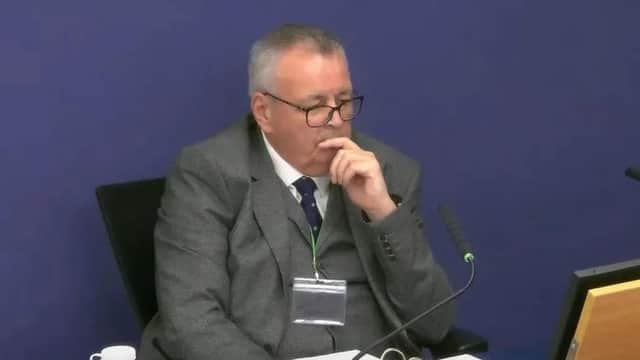Post Office scandal sheds overdue light on Scotland’s prosecutors


I am sure Mr Teale was no worse and no different from any other Procurator Fiscal in how he dealt with a case against a sub-postmaster which was based on evidence from the Horizon computer system.
The failure was institutional rather than individual. As far as Scotland was concerned, the institutions which failed included the Crown Office and Procurator Fiscal Service. What should have been the Scottish advantage of an independent prosecution process turned out to be non-existent.
Mr Teale demonstrated the roots of that failure when he told the inquiry that he had been entitled to accept the evidence provided by Post Office investigators “in the same way that you accept the evidence from a forensic science laboratory”.
Previously, the inquiry heard from the two investigators involved in the case of William Quarm. Messrs Daily and Grant would have been more readily mistaken for nightclub bouncers than forensic scientists. Unqualified, untrained and unscrupulous – yet their evidence was accepted as gospel truth and the sole basis for prosecution.
In this respect, the North Uist case was no different from scores of others which transpired around Scotland. Elsewhere in the UK, the prosecutions were raised directly by the Post Office with disastrous consequences. The question for us is why, with our historically different system, Scotland did no better?
It seems incredible that so many of these cases could arise, involving people of previously impeccable character, all pointing the finger at Horizon, without anyone in the Crown Office noticing a pattern worthy of investigation. Instead, the whole system was geared to accepting the Post Office reports and brushing aside any doubts.
Last week, Mr Teale was asked: “Would you accept that if your case is founded on evidence that’s produced by a computer, then it’s necessary for the prosecutor to consider the reliability of the evidence produced by that computer?”. Mr Teale replied “yes” but the fact is that it did not happen.
As the investigators admitted, they never went near Fujitsu in the North Uist case before submitting their report to the Fiscal. In part, this was attributed to the fact that the senior one was removed in mid-investigation, before being made redundant by the Post Office. It might have been interesting to ask why.
Again, I stress that Mr Teale was not unusual in acting upon these reports without question. In fact, he would have been unique among Scotland’s PFs if he had done otherwise. Some 14 years later, the Lord Advocate endorsed that position by asserting that Fiscals were “entitled” to accept the Post Office’s word. That is a presumption which needs to be challenged.
In Scotland, the Post Office has the status of a Special Reporting Agency, of which there are 171 at the last count. These also include HM Revenue and Customs, Health and Safety Executive, SEPA, the Maritime and Coastguard Agency and Trading Standards departments of local authorities.
These SRAs have the powers of investigation though decisions to prosecute lie with the Procurator Fiscal or, ultimately, the Crown Office. What has become clear from the Horizon scandal (and the North Uist case study) is the extent to which reports from an SRA (the Post Office) went effectively unchallenged before leading to prosecutions and, as it turned out, multiple miscarriages of justice.
In other words, the Scottish criminal justice system relies more than most of us realise on the quality and integrity of investigations carried out by organisations other than the police. To say the least, the Post Office scandal demonstrates why that degree of trust should not be granted lightly and must be open to challenge.
Throughout the UK, the Post Office used its institutional might to face down protests from isolated individuals. It did so ruthlessly and in full awareness that, from the outset, doubts existed about the reliability of the Horizon computer system. It has taken 20 years of human suffering for these injustices to be recognised though only a few have been formally righted.
The Post Office itself is by far the biggest villain of the piece. The Scottish dimension arises from the fact that the miscarriages of justice which occurred here did so under our separate and distinct legal system – yet the outcomes were indistinguishable from England and Wales while the pace of redress has been even slower.
There will be many lessons learned from this affair and I hope those most responsible will be held to account. The complicit role of Scotland’s Crown Office and Procurator Fiscal Service, and their relationship with Special Reporting Agencies, should not be exempt from these conclusions.
(To submit an article to Open Forum, contact [email protected])